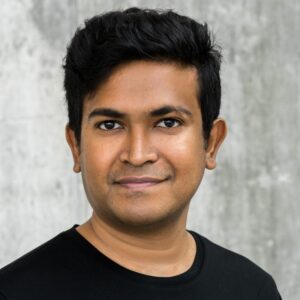
Note: This post has been updated from an earlier version to reflect newly available numbers for Turing’s workforce pool.
Jonathan Siddharth, co-founder and CEO of Turing, talks about how the rise of Turing, a platform that provides access to a global pool of 200,000 talented software engineers in more than 50 countries, is supporting the needs of the healthcare industry and other sectors.
Why did you start this company?
While building out my prior startup, my co-founder Vijay Krishnan and I found it increasingly difficult to hire highly skilled software engineers in Silicon Valley. There was simply a shortage of qualified candidates. As a result we turned to working with remote developers. But there was no system to effectively identify remote developer candidates with the right skills. So we had to develop our own system. The experience taught us that although talent exists everywhere around the globe, that’s not the case with opportunities for challenging work at competitive earnings.

Turing CEO Jonathan Siddharth
What specific need/problem are you seeking to address in healthcare?
Over the past few years, the healthcare industry, along with most other industries, has undertaken a massive digital transformation. This includes a wide range of startup companies employing digital technology to do everything from using AI to identify new drugs and speed up clinical trials, to creating apps to providing easier access to health services and even decrease the cost of health insurance. Every major healthcare and pharmaceutical company is also on their own journey of digital transformation.
The fuel that enables this digital transformation for both startups and major healthcare concerns is access to highly qualified software engineers. Yet, the availability of such talent is severely limited in many major markets, such as Silicon Valley, New York, London and other major centers of tech innovation.
Turing was founded on the idea that while talent is global, opportunity is not. Our platform provides access to a global pool of 170,000 talented software engineers in more than 50 countries. In this way, healthcare companies that need access to highly skilled developers can use Turing to source, vet, engage and manage remote software engineers. And in doing so we are helping the healthcare industry to put the power of digital technology to work solving some of the most pressing health-related concerns facing society today.
What does your product do? How does it work?
Turing is a platform for sourcing and vetting, matching, and managing remote software engineers. Turing enables companies to reduce the time it takes to hire highly skilled software engineers from months to days. Further Turing enables companies to effectively manage remote developers, ensuring they are meeting expectations, while quickly identifying and resolving.
Turing uses advanced data science to source and vet developers, to match the developer with the right skills and experience with the needs of its client companies and to provide post-match quality control.
Turing has created a global pool of more than 170,000 software engineers from more than 50 nations. Turing has accomplished this using a platform that employs automated end-to-end vetting of remote engineers. This system includes self-reporting of skills by developer candidates, validation of skills through automated skill-level testing and interviews, and continuously updated on the job skill advancement.
Turing’s post-match quality control uses automated early detection and mitigation of any performance issues and collects job performance data to improve future matches.
Turing’s latest innovation employs virtual machine technology to enable developers who may not have access to the most advanced computers to work on software projects that require the latest technology. This is accomplished while simultaneously protecting the client’s code and resources and detecting any possible fraud on the part of the remote developer.
Is this your first healthcare startup? What’s your background in healthcare?
We are a company that helps other companies source, vet, hire and manage remote software developers. As the healthcare industry undergoes digital transformation at every level, from discovery of new drugs to managing subscriber health benefits, access to highly qualified software engineers has become critical to the success of every company in the healthcare industry.
Turing was designed to help companies in the healthcare industry meet this challenge. We have a great deal of experience working with healthcare companies and understand their special needs.
We should note, one of our key executives, Prakash Gupta, has extensive experience in the healthcare industry.
What is your company’s business model?
Turing’s revenue is based upon fees charged to customers for its sourcing, vetting, matching and managing services of remote software engineers. Customers pay Turing for hours worked by remote software engineers and Turing handles all payments to those engineers, making the process seamless for both customers and engineers.
Who is your customer? How do you generate revenue?
Our customers are both startups (at the Series A level and above) and the enterprise, both traditional and technology unicorns. Basically any company whose business success is dependent upon access to highly skilled software engineers, which today is basically every company in every industry.
In the healthcare industry the need is particularly acute because many of these companies need engineers with a very high skill level, including special skills, such as experience with machine learning and AI technologies.
Our typical customer in terms of the buyer is pretty broad. They include CEOs, CTOs, VPs of Engineering and Product, and Hiring Managers. Also, CIOs, CHROs and Heads of Procurement and Product Innovation Teams, among others.
Photo: Filograph, Getty Images












